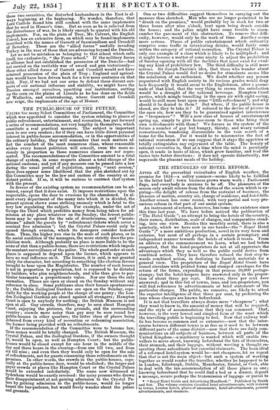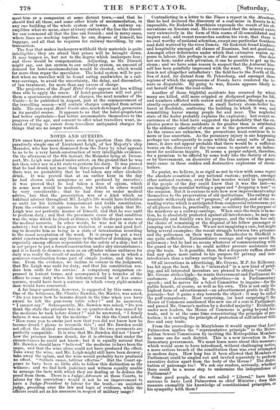THE STRUGGLES OF HOTEL REFORM.
AFTER all the proverbial vicissitudes of English weather, the promise for 1854—a sultry summer—seems likely to be fulfilled in the latter half : town business grows warm work ; Parliament flags, and everybody is anxious to be off. The pleasures of the season only await release from the duties of the season which is ex- piring—the delight of release from the restraint of business, the pleasure of motion, country air, change of residence, and hotel-bills. Another season has come round, with very partial and very pre- carious reform in that part of our social system. An instrument of reform, however, has come into existence since this time last year. We have before noticed the publication of "The Hotel Guide "; an attempt to bring the hotels of the country, their names, distribution, scale of charges, and comparative stand- ing, into one view. Besides this monthly serial, there is also a quarterly, which we have now in our hands—the " Royal Hotel Guide " ;* a more ambitious production, novel in its very form and exterior, but most of all perhaps in a certain peremptory and independent manner towards the hotels of which it treats. From an address at the commencement we learn, what we had before suspected, that the hotel-proprietors do not at all appreciate the advantages which they as well as the public could derive from combined action. They have therefore refused the first step to- wards combined action, in declining to furnish materials for a general view. The proprietors of the Royal Hotel Guide have issued circulars with printed forms and stamped envelopes for the return of the forms, expending in that process 50,000 postage- stamps ; but the hotel-keepers have answered only in the propor- tion of about three per cent. However, three per cent have answered; 'yid in this list of towns, inns, and inn-proprietors, yen will find references to advertisements or brief statements of the particular charges. The public, we conceive, are likely to attest the superior intelligence of that three per cent, by preferring the inns whose charges are known beforehand. It is not that travellers always desire mere " cheapness "; what they want to know is, the amount of money that will be required, and the style of accommodation that they can command. That, however, is the very lowest and simplest form of the want which the travelling public is beginning to feel. Now that railway traf- fic has become so common and so extensive—now that the inter- course between different towns is as free as it used to be between different parts of the same district—now that there are daily com- munications on all subjects of business, between all parts of the United Kingdom—a machinery is wanted which will enable tra- vellers to move about, knowing beforehand the fate of themselves, their stomach, and their luggage, without wasting a thought re- specting those subordinate but essential claimants. The beau ideal of a reformed hotel system would be—not cheapness, let us repeat that that is not the main object—but such a system of working
together as would render the traveller, whether he happened to be in London, Edinburgh, Dublin, Manchester, Bristol, or Cork, able to deal with the inn-accommodation of all those places as one; knowing beforehand that he could find a bed or a dinner, deposit a message, secure perhaps the transmission of luggage or parcel to
* "Royal Hotel Guide and Advertising Handbook." Published by Smith and Son. The volume contains classified hotel advertisements, with indexes to towns, London hotels, places of amusement, hotel advertisements, general advertisements, and steamers.
meet him or a companion at some distant town,—and that he should find all these, and some other kinds of accommodation, in any one building of the whole system of towns. A railway ex- emplitiet what we mean, since at every station of the line the travel- ler can command all that the line can furnish; and in many oases, where lines are working together, he can dispose of himself, his luggage, and all that he requires for railway travelling, by one transaction.
The fear that makes innkeepers withhold their materials is quite intelligible ; they are afraid that prices will be brought down. It may happen so, but not to the degree which innkeepers fear; and there would be compensation. Adjusting, as Mr. Disraeli might say, our inn system to our railway system, an amount of demand for hotel-accommodation would be created, which would far more than repay the speculator. The hotel system will be per- fect when no traveller will be found eating sandwiches in a rail- way-carriage, to avoid the uncertainty, the delay, and discomfort, of inn treatment, far more than any excess of charge. The projectors of the Royal Hotel Guide appear not less willing than able to apply the screw. If hotel-proprietors will not give them a spontaneous statement of charges, the next number of the Guide—to be published in August, just at the commencement of the travelling season—will contain charges compiled from actual bills. The non-royal Hotel Guide also, much developed, perseveres in its parallel course. It appears to us that the hotel-proprietors had better capitulate—had better accommodate themselves to the progress of the age, and consent to offer what travellers want, in- stead of trying to extort from travellers antiquated charges for things that are no longer wanted.



























 Previous page
Previous page